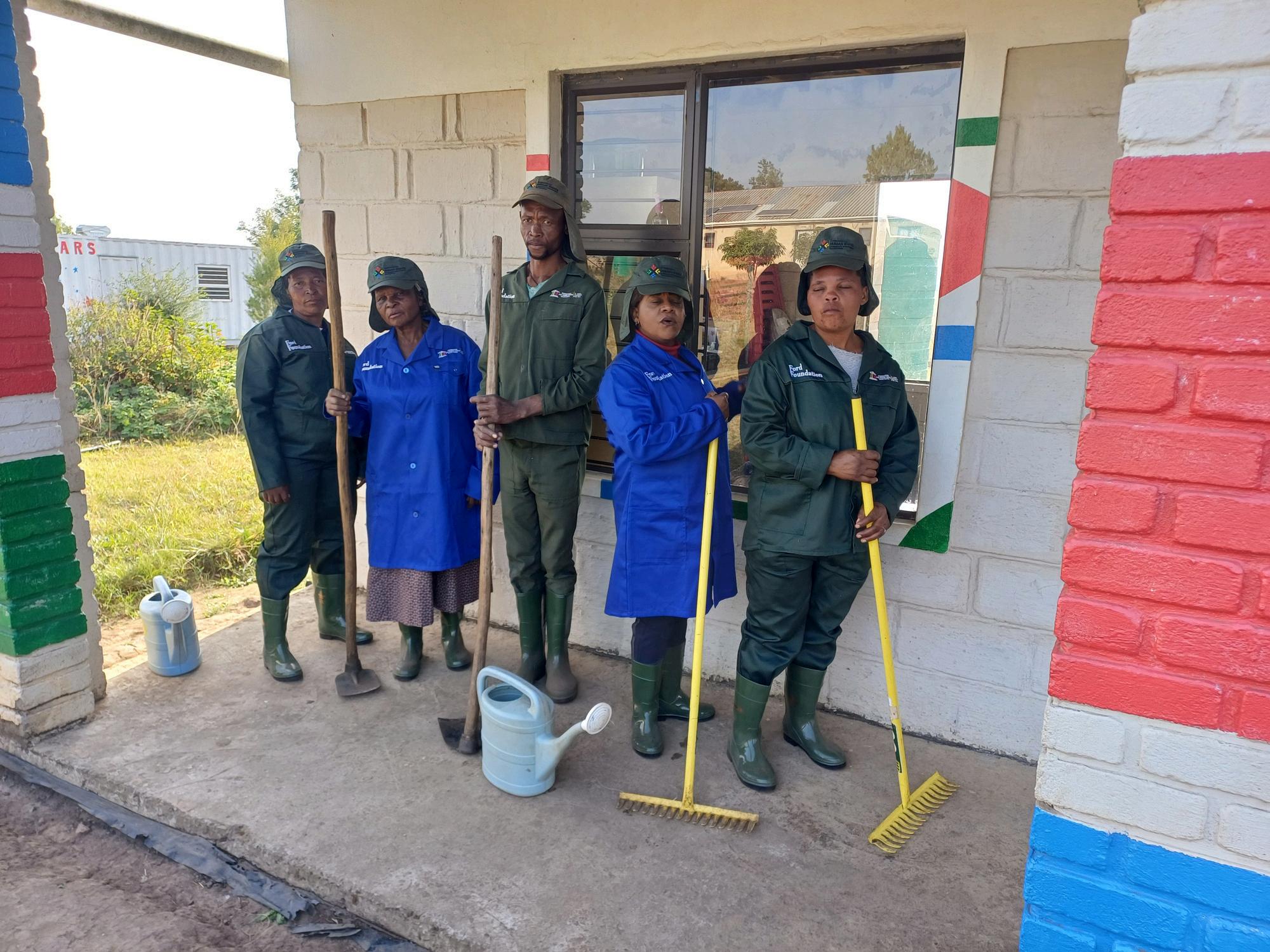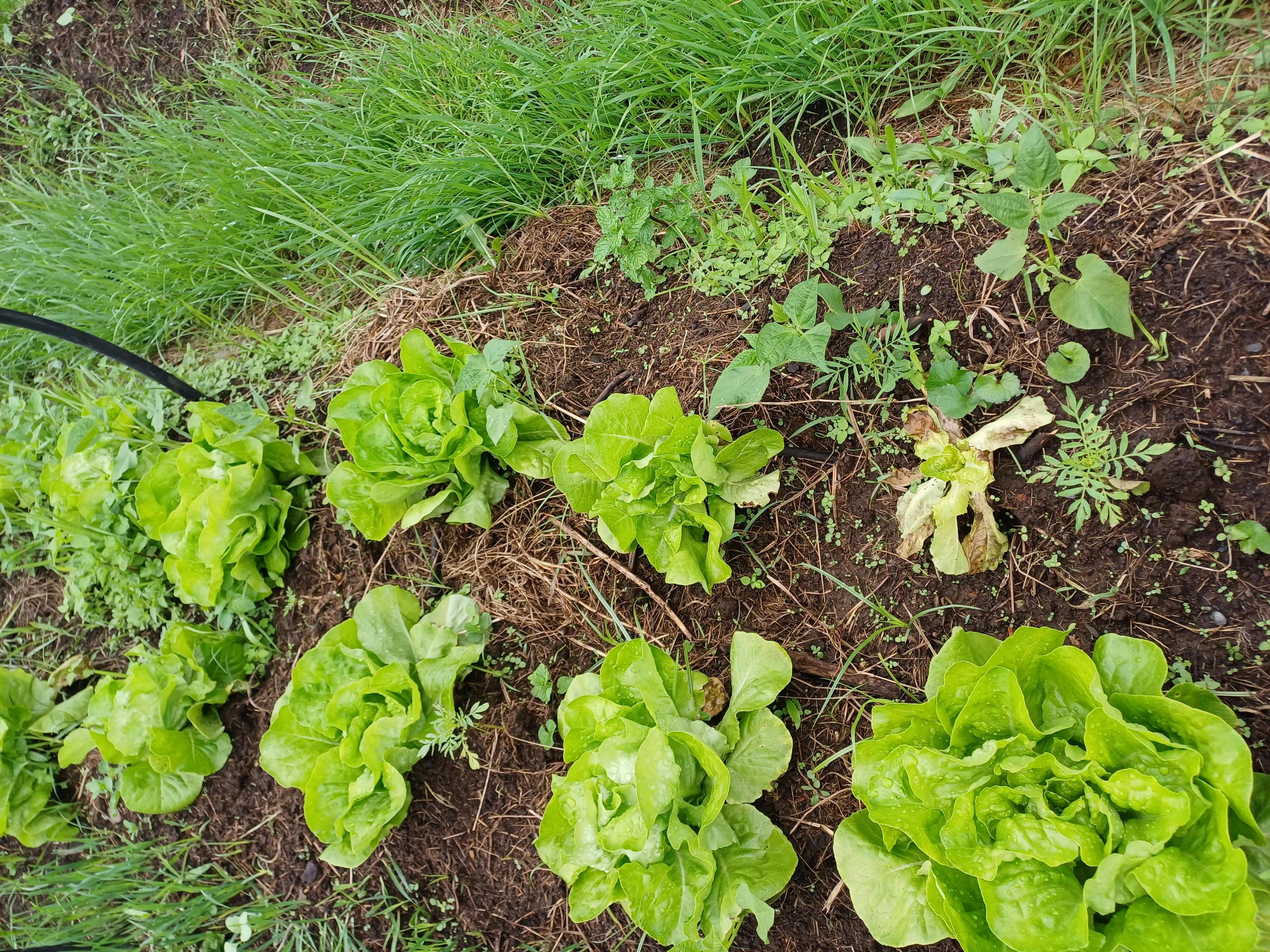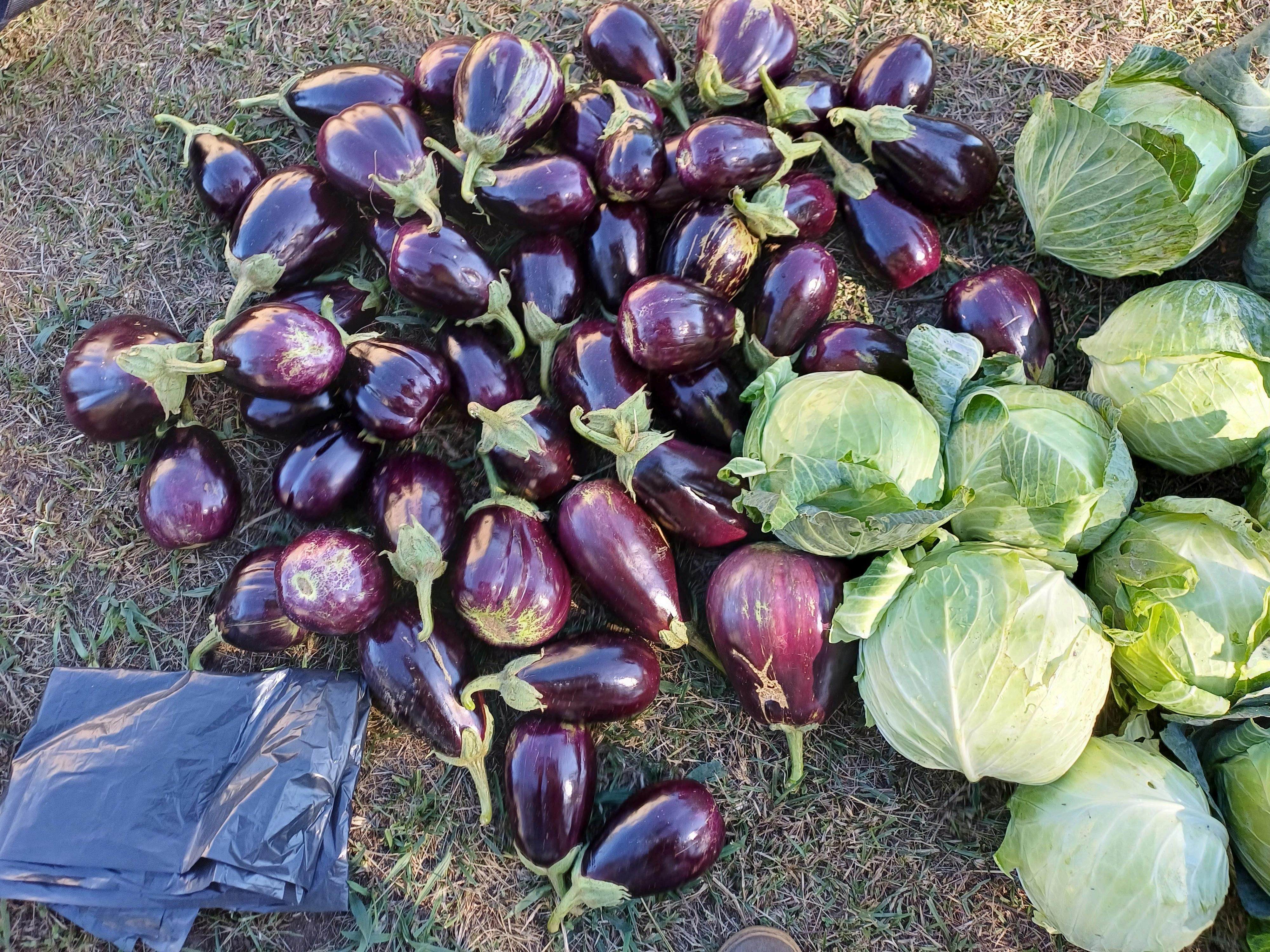
‘Wecangetthe vegetablesfor isishebofromthe garden’
Howafoodgardencanchangelives






‘Wecangetthe vegetablesfor isishebofromthe garden’
Howafoodgardencanchangelives




Wana Johnson Learning Centre was started in 2014 by the family of Wana Johnson as a legacy project, in honour of a social activist who dedicated his life to the development of indigenous people, particularly the amaMpondo of the remote, rural Wild Coast. The organisation is committed to supporting rural communities in achieving their rights to food security, nutrition and environmental sustainabilitythroughnaturalfarmingpractices.Forthepasttenyears, theyhaveoperatedinTaweni,aremoteruralareaintheEasternCape province.
Currently, the Wana Johnson Learning Centre runs a demonstration garden with plans to expand into a school garden and eventually a marketgarden.
The centre helps rural communities grow nutritious food while also protectingandrevitalisingdepletedwaterandsoilresources.Through education, advocacy and collaboration, they seek to empower rural communitieswiththeknowledgeandtoolstotransitiontowardsmore sustainablefarmingmethods.Bypromotingindigenousknowledgeon regenerative agricultural techniques, the Centre aims to improve soil health, conserve water and enhance biodiversity. It enables rural communities to become self-sufficient in food production while protecting natural resources, helping to build a more resilient and sustainablefutureforgenerationstocome.

Continuous elderand youth mentorship programmes
Trainingand educational resourcesonnatural farmingtechniques tailoredtolocal conditions
Anafterschool programme
Granny support groups
Supportforwomen andyouthgrowing foodintheir homestead gardens
AnEarly Childhood Development (ECD)centre
Collaborationwith elders,traditional councils,local organisationsand government
Thisisastoryofincredibleresilience.Itbeginsduringamomentofuncertainty,whenamaindonor’sprogrammecame toanend,andtheWanaJohnsonLearningCentrewasnolongerconsideredviablebecauseitwastooremotelylocated tobeoptimallysupported.Ittellsoftheworkandsisterhoodthathascontinuedevenwhenthestipendsstopped.
Thegardenremainsaplaceofrespite,eventhoughithasnotbeenpossibletogrowmarketcropsatthedesiredscale due to unpredictable seasons and extreme weather caused by climate change. It’s a complex journey of the group learningtotrusttheleadershipandbelievingthattheycancollectivelysustaintheirlivelihoodsovertime.
ThestoryissharedbythreewomenwhoworkattheWanaJohnsonLearningCentre:

KhayaMposula (Ma’Mbhele)-Founderof theWanaJohnsonLearning Centreandcoordinatorof theGrowingFoodforLife project

NombuyiseloMgilane (Mam’Mgilane)–Project partnerinvolvedinthe gardens

NtombzandileMaphini (Mam’Maphini)–Project partnerinvolvedinthe gardens
Mam’Maphini:Inthebeginning,we’djustcometohelpinthegardenwithnoexpectationsofanypayment.I’dsee Sisi [Khaya]alwaysgoingintothegarden.I’dknockonherdoorandoffertohelp.Afterhelpingher,Iendedupenjoyingitso much that I came every day. We got remarks in the beginning, people would say that I was going to help that woman whowasjustusingmeforherownbenefit,whileIgotnothing.
Mam’Mgilane: I had a piece job [informal employment] around here, and I ended up coming to help Khaya with her workinthecommunalgarden.Shewentontostartthepreschool,andwelearntfromeachother.Ilearntalotfromher. Some of the things I saw her doing in the garden were new to me, and other things I already knew. There are also childrenwhocometogethelpwiththeirhomeworkonSaturdays,it’sjustnice.Inthebeginning,whenpeopleaskedme whatIwasdoinghere,I’dsaythatIwasjustvisiting.
KhayaMposula:IreturnedhometoFlagstaff,EasternCape,in2014,andthat’swhentheprojectbegan.WhenIgothere, I’d see people going to town to get their grants, then go into Shoprite to buy potatoes and cabbages and come back home by taxi. People here still want to use their grants to buy vegetables or ingredients for their isishebo [vegetable relish]. SosometimesIfindthatthismindsethasnotchanged.Evenwithmen.Imightaskamantohelpuswithsome heavy lifting in the garden and offer him a head of cabbage in exchange. He’ll refuse and say he’d rather earn the moneytobuyacabbage.Theirattitudeis:‘Iwantyoutopaymesomemoney.’Butifyoufollowtheirmoney,itendsup buyingthesamecabbageatthelocalspazashop.
Soalloftheseexperiencesmotivatedmetotryandgetmorepeopletogrowtheirownvegetablesbecausethegrants aren’t enough to cover all their needs. From there, the project went on to have a preschool, and now we also have an afterschoolprogramme,acommunalgarden, andsomewomenhavetheirownbackyardgardens.
OurplanforrunningtheGrowingFoodforLifeprogrammewastosay:Here’sanopportunity,withtheultimategoalthat we become sustainable over time. So, I believe that the type of Early Childhood Development [ECD] centre we are building–linkedtogrowingfoodgardens–isgoingtotakeussomewhere.Ifyoulookaround,thereisnopreschoolin the area, apart from ours, that has a garden. The primary and high schools have gardens, but there isn’t anything growing in them. So, to me, the ECD space is where this whole mindset of being dependent on handouts is going to slowlychange.
I also picked up that with the previous funder, our programme took on people who had never been in a work environment.Itwasaboutgrowingaworkethic.Gettingpeopletounderstandthat8o’clockmeans8o’clock,thatyou needtobehereontime.Theprojectpartnershadtolearnwhenworkends,whentheycantakelunch,howtonegotiate acontract,andsoon.Weliterallyhadtospendadaywiththetraditionalcouncilgoingthroughtheircontracts,clause for clause, highlighting the ‘dos and don’ts’ to make sure that people could understand their contracts. So, it was actuallyabeautifullearningexperience,seriously;havingthatfunderonboard.

“AtthebeginningofGrowingFood forLife,whatkeptuscomingback wasthatwewerehappytobe meetingupaswomen,including uGranny[thegrandmother].We gottotalkaboutthingsinourlives thatwerenotsittingwellwithus.”
Khaya:WewereinitiallyworriedwhenDavid[thementorfromthe previousfunder],whowasadvisingus,saidweshouldrespondto the Growing Food for Life call for proposals, because we didn’t even have a bank account. Luckily, there weren’t many application requirements. We were so happy when the Foundation for Human Rights [FHR] accepted us, even without much experience or any formal qualifications. This programme welcomedusjustaswewere.
Mam’Maphini: At the beginning of Growing Food for Life, what kept us coming back was that we were happy to be meeting up as women, including uGranny [the grandmother]. We got to talk about things in our lives that were not sitting well with us. By the time we went home, we didn’t feel stressed anymore. This was veryhelpfulandimportantforus.Itwaspowerful.

"Wewerehappywhenthe FoundationforHuman Rights(FHR)acceptedus withoutmuchexperience oranyformalqualification. Thisprogramme welcomedus,justaswe were. "

y , p p
oursthathasagarden.Theprimaryandhighschoolshave gardensbutthereisn’tanythinggrowinginthem.So,tome,the ECDspaceiswherethiswholemindsetofbeingdependenton handoutsisgoingtoslowlychange"

Khaya:MydreamisgraduallychangingfromwhatIhad inmindwhenthegardenprojectbegan,beforewejoined the Growing Food for Life project. When we first started, our dream was to plant and sell our produce. But now, sincejoiningtheGrowing Food for Lifeproject,mydream isforeachandeveryhouseinthevillagetohaveasmall food garden with just enough to feed the family. That is my dream now. My initial dream was to have a market garden where we grew cash crops, like spinach and cabbage,insuchbigvolumesthatwecouldsellthemto retailersinFlagstaff,suchasBoxerandShoprite.Wehave nowrealisedthatwasjustadream.Aftertenyearsofthe project,weareonlynowstartingtosell.
My original dream has also been changed by the reality of climate change – and the fact that you can never grow large numbers of vegetables. Initially, we were looking at chemical farming to produce large volumes: synthetic fertilisers, pesticides and herbicides. But then therealityofwhatweweresayinghitus–whataboutthe environment and the health of the people who eat our produce?

Allofthesethingschangedourdream.Infact,justthismorning,IwastellingMam’MgilanethatIhadevenparticipated insomegeneticallymodifiedorganism[GMO]projects,includingonethatworkedonmaize.Buteventually,youstartto questionwhyyou’dwanttodothattypeoffarmingwhenyouunderstanditsimpactontheenvironment.

So, that’s how the dream has changed. Honestly, it was more about climate change, about being consciousness of people’shealth,lookingaftertheenvironmentandanimalwelfare.
Going forward, we can see that we work very, very hard. We’re also trying to use indigenous farming methods, but our yields aren’t improving. We can’t get to the market-garden phase because of climate change. We’re struggling with sustainability.Oureffortsareconstantlybeingchallengedbytheweather.
It was our expressed wish to become sustainable – that’s why we are doing these agroecology practices. We’ll plant –and it’ll get too hot, and we can’t cover our crops. We’ll plant – and we don’t get any rain because the rain season is delayed. Our water tanks eventually run dry. We’ve got a beautiful irrigation system, but we just can’t predict the weather. So, it means that at some point, we’ll always be hoping for support from funders because the dream of a marketgardenhasbeendelayedbyfactorsbeyondourcontrol.So,thedreamismovingfurtheraway.
Mam’Maphini:ThedifficultyIfacedwhenIjoinedtheprojectwasnothavinganymoney.Beforetheprojectbegan,the situationwasn’tgoodatall.Weeventurnedtomakingbricksforpeoplebuildinghousesbecausewewereunemployed. WewouldgetpaidR150formakingahundredbricks.Lifewasnotgoodatthatpoint,andwedidbrickmakingtotryand survive.
Havingmoneymakesyoufeelalright.You’renotthinkingabouttoomuch.Theonlythingisthatyoumustmakesurenot towasteit.
Mam’Mgilane: I also had that challenge when I joined the project; not having any money. Where we could, we’d do household duties for money. We used what we made from those domestic jobs to buy mealie meal when we were runningoutoffood,ortobuyschoolshoesforourkids.
Khaya:For me, it’s still difficult because I’m so remote. I worked in Joburg for many years, then I relocated to Durban –and eventually things just gravitated, and I ended up here. My family is in Durban. This situation is ongoing and so I do feelisolated.Peoplesayit’slonelyatthetop!
Soyeah,theactualprojectchallengesarejusttrustissues.Therearetrustissuesinanysituation,buttrustisabigonefor me, personally. In business, it’s a bit awkward when you come to a remote area and you find there’s issues like: ‘She’s educated,sowecan’ttrusther.Shemightpullsomethingonus,youknow?’AndIthinkpeoplehavetrustissueslikethis because people have been promised so many things, whether it’s by the government or the church. We’ve been promisedthingsallalongtheway,butthosepromisesareneverkept.Istruggletogetpeoples’buy-in.It’sliketheycan never get enough of asking, ‘Why would she really leave the city and come and live here?’ And it seems like they’re thinking: ‘Oh, maybe she failed in the city and that’s why she came here.’ The issue with trust is an ongoing thing. You canhearthroughoutourconversationsthattheissueofmoneystillcomesup.
When an opportunity turns up, we all hope that it will come with money. Even when we were informed by the FHR that we were getting uniforms and personal protective equipment, I was hesitant to talk to the ladies about it because the expectation is that if we wear a uniform, it means we are working for an organisation that is paying us. It’s tricky explaining this to the project partners because although they may agree to wear the uniform, in the background, they are questioning: ‘What happened to the money? Why are we not getting any money? Why is Ma’Mbhele [Khaya’s clan name] agreeing to us not being paid? Is she taking the money and notgivinganytous?’It’snotlikeit’sagainstmeasaperson–that I can’t convince or make them trust me. It’s just that the minute money comes into the equation, you can’t satisfy people enough because we are all looking for this elusive money.
Mam’Maphini:When I met the FHR team, some were wearing uniforms, and I got excited. I love the uniform! I thought to myself,‘I’dliketoseemyselfinthesameuniform.’Wearingthe uniform makes me feel proud when I picture myself working andearningmoney.Seeingyourteammateswearinguniforms mademefeellikeyou’reheretodiscussseriousbusiness,and thatwhatyou’reofferingisgoingtobenefitusalot.
Khaya: In the ten years of operating as Wana Johnson, even the things that I thought were straightforward and easy to understand have become so muddled by the question of money.

Mam’Maphini:IwasfeelingalotofstressbecausetherewassomuchgoingoninmylifewhenIjoined.Icouldtellyoua longstorybut,aftersharingmytroubleswiththewomenhere,Ifeltencouraged.Ibecamestrongerthankstotheladies from the project. What makes us happy about being here is that we get to wake up and leave our homes. We get to leave behind the things that stress us at home. We get to avoid conflict and a lot of things that can hurt you, because youarenotathomemuchduringtheday.
Ijoinedasawidowwitholderkids,sobeingapartoftheproject helpedmekeepbusy.Ithelpedmetobeproductiveandnotgo gallivantinginthestreets.IdecidedthatIshouldlovegardeningand workingwithmyhands.That’swhathelpedmetolovebeingpartof theproject.
Khaya:Forme,it’ssimilartotheotherladies.IlikethefactthattherearealotofpeopleintheyardbecauseIlivealone on this big site. I like literally just having people around me. As much as we are here to farm or to learn, we also get to chat.Iwishtheotherladieswouldn’tgohomeonsomedays.Havingtheotherladiesaspartoftheprojecthasbeena wonderfuladditiontothejourney.Ithinkthatmyconfidencelevelshaveimproved.
I’mnowlearningalotmoreaboutindigenouspracticesandtraditionalcrafts,whichIknewnothingabout.I’mlearning howthingslikereedbasketsandgrassmatsaretraditionallymade.Whentheladiestalkabouthowthingsweredonein theoldendays,Igetsocuriousandaskquestionslike:‘Howarereedsgrown?Wheredotheygetreedsfrom?’AlthoughI wasbornhere,Imovedtotown,soIhadlosttouchwiththetraditionalwaysoflivinganddoingthings.
Mam’Maphini:TheexcitementIfeelisfromhavingabackyardgarden,eventhoughitstillneedstobeproperlyfenced andprotectedfromlivestock.
"Whatmakesushappyaboutbeinghereisthatwegettowake

Mam’Maphini: Backyard gardens are not common in our area since people usually farm on large family fields. Some peopledon’thavebackyardgardensbecausetheyarelazy.Andothersdon’thavefencedyards.Anothercommonissue isthelackofwater–andyoucan’tgrowplantswithoutwater.
Khaya:Istillfindthewaterproblemtobeabigdeterrent.WhenIencouragethecommunitytogrowfoodgardens,they say,‘ButMa’Mbhele,wheredoIgetwaterfrom?’So,abigfocusoftheWanaJohnsonLearningCentreistoprovidewater toourcommunities.Tome,wecan’ttalkaboutfoodifthereisnowater.
ThefirstthingthatweintroducedwastheHippoRoller,whichisadrumthatholds90litresofwater.Andyoucanpushit home.Childrenarenowalsoabletofetchwater.Boychildrenwereveryhesitant.Afteracertainage,theystopgoingto fetchwater.Nowthatthere’stheHippoRoller,everyonetakesonthischore.TheHippoRollerhasbeenournumberone solution.
We’vealsoaskedaroundforthefundstogetsomethingcalledSpringProtection,whichinvolvestakinganexistingwater source, however small, cleaning it up, containing the water and using pumps to bring it closer to the community. So, we’vecompletedquiteabigSpringProtectionprojectinDolophini, thevillageMam’Maphiniisfrom.Onatwo-kilometre stretch,theynowhaveeightstandpipes.Allfromonelittlespringinthevalley.

Mam’Maphini:IfIweretospeakaboutmyvillage,Dolophini,whereIcomefrom,since Sisi [Khaya]camehere,weare livinginabetterway.Peopledon’tfetchwaterfromtheriveranymore.Sheinstalledtapsthatareonlyabouttwotofive minutesfromourhouses.Wedon’thavetogofartofetchwaterortowashourlaundry.Wearehappy,it’sverybeautiful.
SincewegotourHippoRollers,oursmallchildren,fromasyoungasfourorfiveyearsold,cannowfetchwater.Weare veryhappy.Andwetrustthatwe’regoingtogetevenhappier.
"Tome,evenbeforewecantalkaboutfood,itcan’thappenif thereisnowater"

Mam’Mgilane: I am personally seeing a difference since we started working on our own backyard gardens. We no longer strugglewithgettingisishebo.Atleast,ifwestruggle,we’lljust bestrugglingtogetmealie-meal.Wecangetthevegetables forisishebofromthegarden.
Mam’Maphini:Whenpeoplehavesomefoodathomebutno vegetables,theycanbuythemfromhereandnotintown.
Khaya: I always wanted us to help people grow their own vegetables to get isishebo, just so people can have something to cook so they can go to bed after feeding their families.
Mam’Maphini: I have a vision to plant potatoes, cabbages andspinach.Idon’twanttogoandbuyvegetablesanymore. AndIwantotherpeopletobuythemfrommeaswell.

Khaya: I think that Wana Johnson shouldeventuallybecomeaone-stop centre. The thing that Mam’Maphini was talking about is that even if people have to buy mealie meal in town, they can always get their vegetables here. So, we think that this one-stop centre could solve many other problems. Such a centre could haveanythingandeverythingthatthe communityneeded.I’dlovetheWana Johnson Learning Centre to be known onedayasthecentrethattrieditall.
Mam’Mgilane:Myhopeisthatwecan build something that won’t ever end, that we can go the distance with and get something from. Something that willbringsomechangetothevillage.

Khaya: Currently, because we now have a preschool, Mam’Mgilane, for example, can come and work on the project without having to worry about childcare. We don’t charge the project partners any school fees because they can’t afford it. Children also need an afterschool programme. And so we don’t charge the project partners a set fee to bring their children. Holistically speaking, the project is sort of slowly moving towards sustainabilitywiththisintervention.Becauseofit,wecankeepyoungpeople inourspacetoencouragethemtoalsostartenjoyingthegardeningaspect of food security. So, at the moment, we’d also like to advance these school programmessothatweareabletoprovideagoodlearningenvironment.
Mam’Mgilane and I are going to THANDA [another Growing Food for Life partner] in Port Shepstone. We’re going to check out their holistic programme.WewanttolearnhowwecandevelopourECDandafterschool effortsandincorporatethemintoourfoodgardeningproject.
Mam’Maphini: I wish that we can have a programme that won’t end. One that would employ many people so that they don’t have to only find employment in cities like Durban. I wish for a project where humble people areworkingwithgoodattitudesandwhoarerespectful.Thatismywish.
Khaya:People generally take a taxi to go and scan a document or to type their CVs in town. So we just started this little print shop facility. But we’re unabletoadvancethisplanbecausewe’reusinglittlemachinesfromGame and not the proper multifunction machines for big jobs. Also, it’s still very difficult because even when you have a young person working there, how are they going to get paid? What if there are no customers that day? We haven’t been able to promote it very well. But these are some of the things wetrytodo.

learning,wealso gettochat.Iwish theywon’tleaveon somedays"
Khaya: We had a youth employment programme before the Growing Food for Life programme and so we are still hoping to get more youth interested The 12 months of that employment programme didn’t go well The young people

Mam’Mgilane:Eventhoughwedon’tgetstipendsanymore,Ihaven’tloststrength–I’mstillturningup.Wehavealotof hopethatwewillearnsomeincome,becausewearestillhere.
Khaya: I think, for me, I have mixed feelings. On some days, we get discouraged and that’s expected. I do feel discouraged sometimes and I also feel stressed. It is stressful because people are looking to you to make something happen–‘Surelythere’ssomethingyoushouldbedoing!’
Sometimes,youevenstrugglewithcommunication,youarenotsurehowyouwillcommunicate.Sometimes,youspeak butthenyounoticethatpeoplearestillconfused,maybethey’vemisunderstoodwhatyousaid.Youhearpeoplesaying yousaidtheremightbeanopportunitytogetpaid,andyouthinktoyourself,‘ButIdidn’tsaythat!’
So, I do feel the strain. Physically, I can feel it. I’m not as strong as I used to be. The other day, I had a container on my backwhileIwassprayingcabbages.Thenextday,Icouldn’tgetupbecausemybackwassosore.Justrecently,afterwe had finished harvesting, Mam’Mgilane, went down, she was sick and lying down flat. I don’t know how she felt, but it frustratedmebecausewhensheisn’taround,youcanreallytellthatshe’snothere.Thesethingshaveanimpactonyou –thefactthatwearen’tyounganymore.
Mam’Mgilane:When we were initially getting stipends, it gave me hope: if we kept going for longer, I could eventually haveenoughmoneytostartabusiness,sellingchickens.Inthebeginning,Iwouldcometoworkwithsomeone,butshe stopped coming because she got tired of working for no money. When we started getting a stipend, she wanted to come back. But she couldn’t because the stipends were for project partners only. It was bad when we stopped getting stipendsbecausebeforewehadhope.Ourhouseshadstartedfallingapartbecausewedidn’thavemoneytofixtheold structures.Withthestipends,wehadstartedrebuildingthem.Itwasreallyhardwhenthatfunderleftus.
Mam’Maphini: When we started getting stipends, people started taking our work seriously. They saw that there was something benefitting us here. They wishedthattheywerealsoinvolvedintheproject.
Khaya:Icansaythatitwastraumaticwhenthefunder,whogaveusstipends, left. You can still see the effects in the landscape. It’s just not the same. From havingfiftyparticipantsontheproject,twodaysaweek,tosuddenlyhavingto swaparoundfourpeopletocoverthewholeweekjusthasn’tbeeneasy.
Within that group of fifty people, there were different skill sets. For example, when we got a water tank from another programme, we knew that we had buildersontheprojectwhocouldbuildastandforit.Iftherewereholesinthe fence, we had men who could easily fix them for us. Even for cutting grass. There were people on the programme who could cut grass for us with the brushcutter.
Nowwearejustlefthere,onourown.It’sjusttraumatic.Andit'sthethingsthat makeyouthinkthatthecommunitymustbelaughingatyou,saying,‘Shewas onahightheotherday.Theprojectgardenwasgreen,itwasbeautiful,andit was full of life and activity.’ Suddenly, there is nothing happening. It is traumatic.
Mam’Maphini: We do still have hope. Because we once worked on a project with a stipend and we are keeping up with the work, we are hopeful that one day there will be something. I have hope that although we got negative commentsatfirst,wedidn’tstopworkingontheproject,evenwhenthestipend supportstoppedandwewerenotgettinganything.
Inourhearts,westillhavealotofhope.We’rehappy.We’rewatchingthekids. We’rejustworkinginthegardenandnothingistroublingus.
"Intenyears ofbeinginthe project,weareonly startingtosell now "


Khaya:Ourbiggestfocusisonprogrammesthatwillaccommodateandcaterforwidowsandforpeoplewhoareinthis agegroupthatisnotbeinglookedafter[35-years-oldandupwards].Theydon’twanttobelookedafter,actually,they justwantprogrammesthatarerelevant,thatencourageandinspirethemtodomoretolookaftertheirfamilies.
We feel we’re so remote. We’re too far from mentorship programmes and interventions. If we could just have more assistance.Becausewe’reherealone,wedon’tknowwhenwedothingsincorrectly.Wedon’tknowwhatelsewecould be doing. We need some experts who could probably help us to do better with proposal writing and attract more fundingpartners.
I think we also need more capacity building or more partners whose farms we could visit and observe other programmes doing similar work, under similar conditions, but who are making it work. When David [from the previous funder] was guiding us, we felt like we had a mentor, someone who came and taught us things. We felt like we had power.DavidwouldconnectuswithinitiativeslikeGrowingFoodforLife.
Mam’Mgilane:Weneedsupportwithkeepingpoultryandcandle-making.Weknowhowtomakecandlesbutwedon’t havethewax.
Khaya: The biggest thing I’m really looking at getting are tunnels [‘polytunnels’ are widely used in sustainable and small-scale agriculture to provide shelter for plants from harsh weather conditions]. Maybe one big tunnel, so we can keep some crops under cover as well as have something to improve our irrigation. Our water reservoir facility is not sufficientatthemoment.Soweneedthesystem,whichisconnectedtoaspringnotfarfromhere,topumpmorewater intothegarden.Basically,weneedwaterandaspacecoveringsomeofthecropstoprotectthemfromharshweather conditions.
Mam’Maphini:We’rehappywithbeingintheproject,butwhat’snotsittingsowellwithmeisthattherearesomegaps in our fence that let animals get in and destroy our crops. Part of my budget for next year, if God helps me, is to also fencemyyard.Weneedmorefencingbecauselivestockentersthroughthegapsinthefence.
Khaya:Isuggestthatwecanalsolearnbakingandbecomealocalbakery.Wecouldbakebreadandsomecakes,here, locallyforthelittleones’birthdays.Forthepreschool,wereallyneedplayequipmentforthelittleonesbecausewedon’t havethebudgettobuildthemajunglegym.We’vegotalittlebitofthegardeningstuffforthemtodo,butwestillneed tohaveasmalloutdoorplayarea.
By the way, Mam’Maphini always tells me that she won’t die before learning to drive and having a car. I think she has forgotten now but she always tells me that this is her dream. So, if this project goes well, there’s no reason why some peoplecan’tachievesuchdreams.
Mam’Maphini:WhatIwouldloveisforsomeonetoteachushowtodriveandhowtogetourdrivinglicences.Thatwould be very helpful. I’ve planned that, this year, even without having any money, I’d get my driving licence. Being able to drive,I’devenconsiderworkingforthefuneralparlouranddrivingforthem.
Mam’Mgilane:Itwouldalsobehelpfulifwecouldgetacar,todrivearoundthecommunitysellingourproduceinstead ofdoingitonfoot.Thiswholeweek,I’vebeenwalkingaroundsellingbrinjalsandcabbages.
Khaya:One day, I’ll probably leave to go look after my grandchildren [gets choked up with tears and stops to collect herself].Thedreamkeepsonchangingbecauseofcircumstancesthatwecan’tcontrol.Thechildrenaregettingolder.I have a granddaughter, and I would like her to be part of my life. But I can’t because I am so far. And when you think aboutit,Idon’tevenhavemyownplace.
So,someofthesefactorsdohaveanimpactonme.Ithinkit’sbecauseofthediscussionswehaveaboutsustainability and continuity. How can we, or how do we, work without it being a case of: ‘I’ve done my best… and I need to leave at somepoint’?
The project wouldn’t be where it is if these women weren’t here. The gates would’ve closed a long time ago. Their contributionishugeandwiththedreamsthatwespokeabouttoday,thisprojectwillcontinue.

